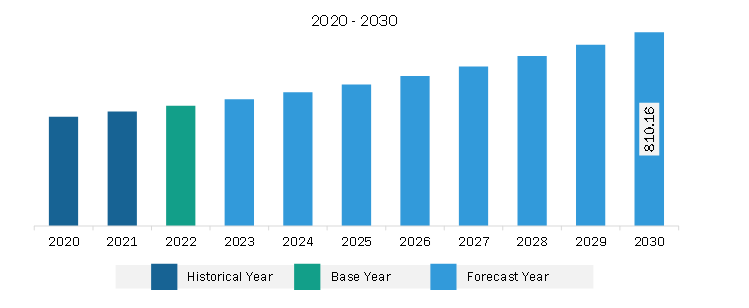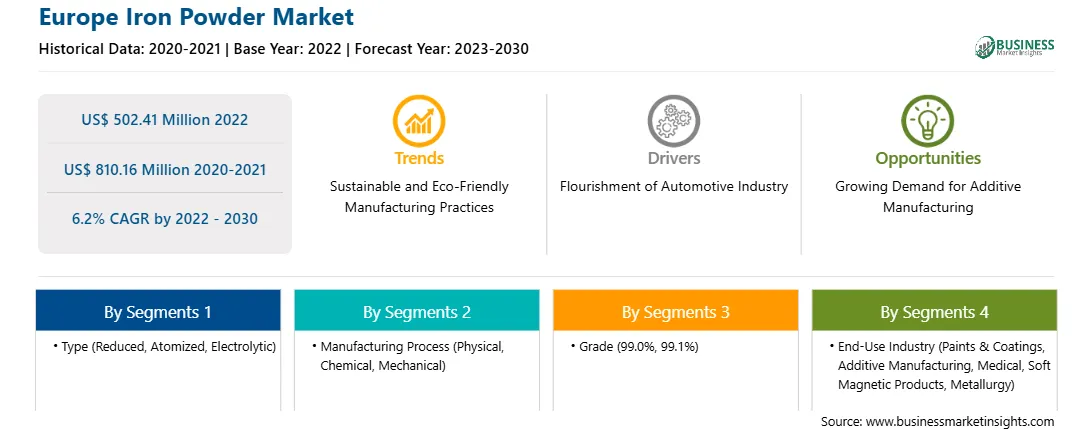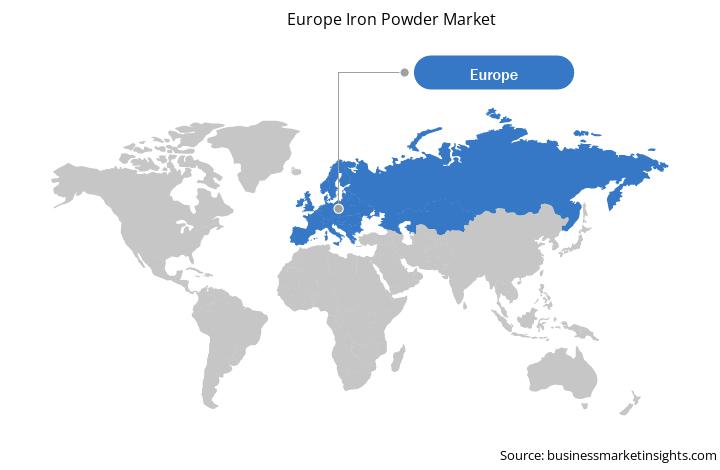The Europe iron powder market was valued at US$ 502.41 million in 2022 and is expected to reach US$ 810.16 million by 2030; it is estimated to register a CAGR of 6.2% from 2022 to 2030.
The automotive industry heavily relies on iron powder as it is a fundamental raw material in the field of powder metallurgy. This manufacturing process involves shaping and sintering metal powders to create intricate parts. Automotive manufacturers increasingly turn to powder metallurgy for the production of components such as gears, bearings, and bushings, as it offers cost-effective, precise, and resource-efficient manufacturing solutions. In addition, in recent years, the automotive sector has heavily invested in reducing the weight of vehicles to enhance fuel efficiency and reduce emissions. Iron powder, when integrated into metal matrix composites and other advanced materials, can contribute to the development of lightweight components that maintain structural integrity. These components are integral to achieving the industry's lightweight objectives, resulting in more fuel-efficient vehicles and a reduced carbon footprint.
As the automotive industry experiences a transformative shift toward electric vehicles (EVs), iron powder's role becomes even more crucial. Electric motors used in EVs often rely on iron powder for the production of soft magnetic cores, which are essential for the motors' efficiency and performance. According to the International Energy Agency's annual Global Electric Vehicle Outlook, over 10 million electric cars were sold worldwide in 2022, and sales are projected to grow by another 35% in 2023 to reach 14 million. In addition, Volvo Cars has announced a third manufacturing plant in Kosice, Slovakia. The plant will help the company to meet the continued demand of its electric vehicles and capture future growth potential. With the global push for electrification, the demand for iron powder as a core material in EV components has grown substantially. This growing demand from the automotive parts industry drives the Europe iron powder market expansion. Its pivotal role in powder metallurgy, and involvement in EV technologies contribute to its growth. As the automotive parts sector continues to evolve and innovate, iron powder is poised to remain a fundamental material for the production of high-quality, efficient, and environmentally responsible automotive components.
The Europe iron powder market is segmented into Germany, France, Italy, the UK, Russia, and the Rest of Europe. The Europe iron powder market is a significant segment of the global metal powder industry, which plays a crucial role in various sectors, including automotive, construction, manufacturing, and electronics. In Europe, automotive manufacturers use iron powder in the production of components such as brake pads and clutch plates, benefiting from its high strength and cost-effectiveness. In addition, iron powder is also utilized to manufacture sintered parts in the automotive industry. For instance, more than 200,000 metric ton of sintered components have been produced in Europe in recent years.
The demand for advanced surface coating technologies is continually progressing in major end-use industries such as steel, aerospace, oil & gas, and power. Iron powder is also utilized in the metallurgy sector in the manufacturing of several products and coating applications. Moreover, according to the European Commission, the construction sector is crucial to the EU economy. The industry provides 18 million direct jobs and contributes to ~9% of the region's GDP. Thus, the surge in the application of iron powder in diamond tools, welding, 3D printing, and others, coupled with the growth in the construction sector, is anticipated to create demand for iron powder in Europe.
The construction industry has also embraced iron powder for its role in producing high-strength concrete, enhancing structural integrity. The growing trend toward additive manufacturing has driven the use of iron powder in 3D printing processes, further boosting market expansion. Iron powder has gained prominence in the additive manufacturing sector. European companies are exploring its use in 3D printing processes to create intricate and high-strength components, particularly in aerospace and medical device manufacturing. However, environmental concerns and stringent regulations regarding emissions and waste disposal are pushing manufacturers to adopt more sustainable and efficient production methods. Fluctuations in raw material prices also impact the market, as iron ore prices can be volatile.

Strategic insights for the Europe Iron Powder provides data-driven analysis of the industry landscape, including current trends, key players, and regional nuances. These insights offer actionable recommendations, enabling readers to differentiate themselves from competitors by identifying untapped segments or developing unique value propositions. Leveraging data analytics, these insights help industry players anticipate the market shifts, whether investors, manufacturers, or other stakeholders. A future-oriented perspective is essential, helping stakeholders anticipate market shifts and position themselves for long-term success in this dynamic region. Ultimately, effective strategic insights empower readers to make informed decisions that drive profitability and achieve their business objectives within the market.

| Report Attribute | Details |
|---|---|
| Market size in 2022 | US$ 502.41 Million |
| Market Size by 2030 | US$ 810.16 Million |
| Global CAGR (2022 - 2030) | 6.2% |
| Historical Data | 2020-2021 |
| Forecast period | 2023-2030 |
| Segments Covered |
By Type
|
| Regions and Countries Covered | Europe
|
| Market leaders and key company profiles |
The geographic scope of the Europe Iron Powder refers to the specific areas in which a business operates and competes. Understanding local distinctions, such as diverse consumer preferences (e.g., demand for specific plug types or battery backup durations), varying economic conditions, and regulatory environments, is crucial for tailoring strategies to specific markets. Businesses can expand their reach by identifying underserved areas or adapting their offerings to meet local demands. A clear market focus allows for more effective resource allocation, targeted marketing campaigns, and better positioning against local competitors, ultimately driving growth in those targeted areas.

The Europe iron powder market is categorized into type, grade, manufacturing process, end-use industry, and country.
Based on type, the Europe iron powder market is segmented into reduced, atomized, and electrolytic. The atomized segment held the largest market share in 2022.
In terms of grade, the Europe iron powder market is bifurcated into ≤ 99.0% and ≥ 99.1%. The ≤ 99.0% segment held a larger market share in 2022.
By manufacturing process, the Europe iron powder market is categorized into physical, chemical, and mechanical. The physical segment held the largest market share in 2022. Furthermore, the physical segment is further subsegmented into atomization and electro deposition. Additionally, the chemical segment is further subsegmented into reduction and decomposition.
Based on end-use industry, the Europe iron powder market is segmented into paints and coatings, additive manufacturing, medical, soft magnetic products, metallurgy, and others. The metallurgy segment held the largest market share in 2022. Furthermore, the metallurgy segment is further subsegmented into compound brazing, compound sintering, compound welding, and others.
By country, the Europe iron powder market is segmented into Germany, France, Italy, the UK, Russia, and the Rest of Europe. Germany dominated the Europe iron powder market share in 2022.
Rio Tinto Metal Powders, American Elements Inc, Industrial Metal Powders (India) Pvt Ltd, CNPC Powder North America Inc, Ashland Inc, BASF SE, Hoganas AB, Reade International Corp, and Kobe Steel Ltd are among the leading companies operating in the Europe iron powder market.
1. American Elements Inc
2. Ashland Inc
3. BASF SE
4. CNPC Powder North America Inc
5. Hoganas AB
6. Industrial Metal Powders (India) Pvt Ltd
7. Kobe Steel Ltd
8. Reade International Corp
9. Rio Tinto Metal Powders
10. JFE Steel Corp.
The Europe Iron Powder Market is valued at US$ 502.41 Million in 2022, it is projected to reach US$ 810.16 Million by 2030.
As per our report Europe Iron Powder Market, the market size is valued at US$ 502.41 Million in 2022, projecting it to reach US$ 810.16 Million by 2030. This translates to a CAGR of approximately 6.2% during the forecast period.
The Europe Iron Powder Market report typically cover these key segments-
The historic period, base year, and forecast period can vary slightly depending on the specific market research report. However, for the Europe Iron Powder Market report:
The Europe Iron Powder Market is populated by several key players, each contributing to its growth and innovation. Some of the major players include:
The Europe Iron Powder Market report is valuable for diverse stakeholders, including:
Essentially, anyone involved in or considering involvement in the Europe Iron Powder Market value chain can benefit from the information contained in a comprehensive market report.